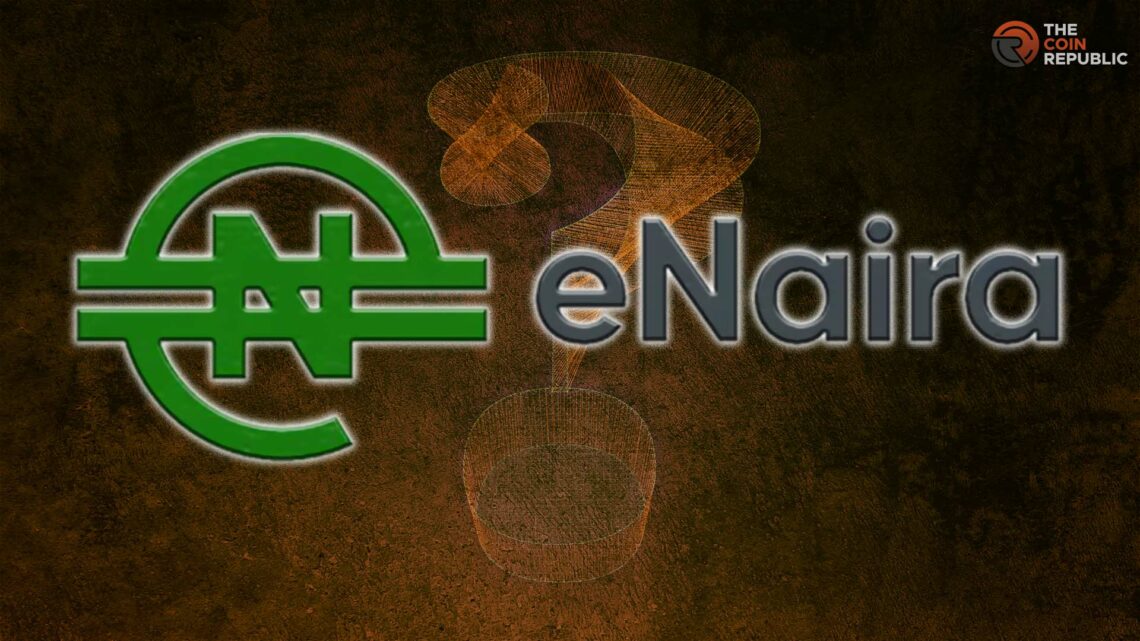- 1 eNaira is the digital currency of Nigeria.
- 2 This is a digital currency and not a cryptocurrency.
- 3 The central bank hopes to reduce the cost of processing cash via eNaira.
The Central Bank of Nigeria (CBN) launched its official digital currency on October 25th, 2021. The currency called eNaira, was developed by Bitt, a fintech company based in the Caribbean. At its launch in the State House in Abuja, the Central Bank governor announced that 500 million eNaira ($1.21 million) had already been minted. They also developed an app called the “eNaira Speed App” for citizens to trade with the new currency.
eNaira: A New Alternative by CBN
eNaira is backed by the government and utilizes the blockchain, open ledger technology, to prevent counterfeiting. The introduction of eNaira will enable peer-to-peer transactions. Unlike Bitcoin, this digital currency is supported by the Nigerian government and is pegged to Naira, the traditional or fiat currency of Nigeria. Thus, any fluctuations in the crypto market will not affect its value.
The digital currency will help citizens to easily process digital transactions, reducing the need for physical currency notes. The eNaira wallet is needed to access, use and hold the currency. It is a digital storage that holds eNaira and can be used to exchange eNaira for other Central Bank Digital Currencies (CBDC). Financial institutions will be intermediaries between the CBN and customers for overlooking ID verification and processing payments.
There are transactions and certain balance limits for individual eNaira wallets, which are determined by the customer’s tier. There are four tiers: Tier 0, Tier 1, Tier 2 and Tier 3, each of which have a specific limit on daily transactions. eNaira is expected to challenge the traditional Naira as a more efficient, less costly, safe and secure mode of payment.
The CBN introduced eNaira with the aim to achieve multiple benefits, such as greater financial inclusion, reduced informality and facilitation of remittances. eNaira is expected to expand its services to any citizen with a mobile phone, even if they do not own a bank account. The eNaira will charge lower transfer costs, and make it easier for citizens to make payments through eNaira wallets.
It’s Risky Too
Nigeria has a large informal economy. Transactions are traceable which brings greater transparency and strengthens the tax base. However, like other digital currencies, eNaira also suffers from issues like monetary policy implementation, cyber security, financial integrity and stability. For example, eNaira wallets may reduce demand for deposits in commercial banks, which might affect the economy.
Other risks that the currency might face include illicit activities, such as money laundering and terror-financing. Data protection and privacy are also other concerns which need proper systems to protect user rights. Citizens should also be educated about adverse situations that might arise.
To make the digital currency successful, Nigeria needs to ensure that the technological infrastructure and technological know-how are in place to address challenges.

Andrew is a blockchain developer who developed his interest in cryptocurrencies while pursuing his post-graduation major in blockchain development. He is a keen observer of details and shares his passion for writing, along with coding. His backend knowledge about blockchain helps him give a unique perspective to his writing skills, and a reliable craft at explaining the concepts such as blockchain programming, languages and token minting. He also frequently shares technical details and performance indicators of ICOs and IDOs.


 Home
Home News
News










